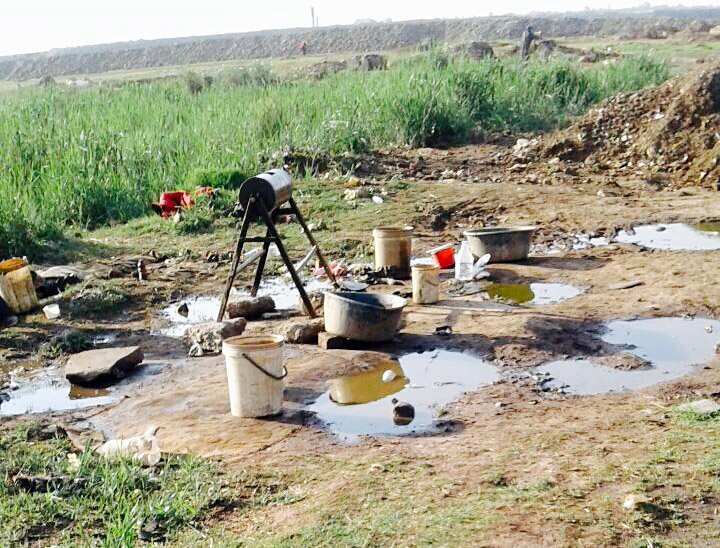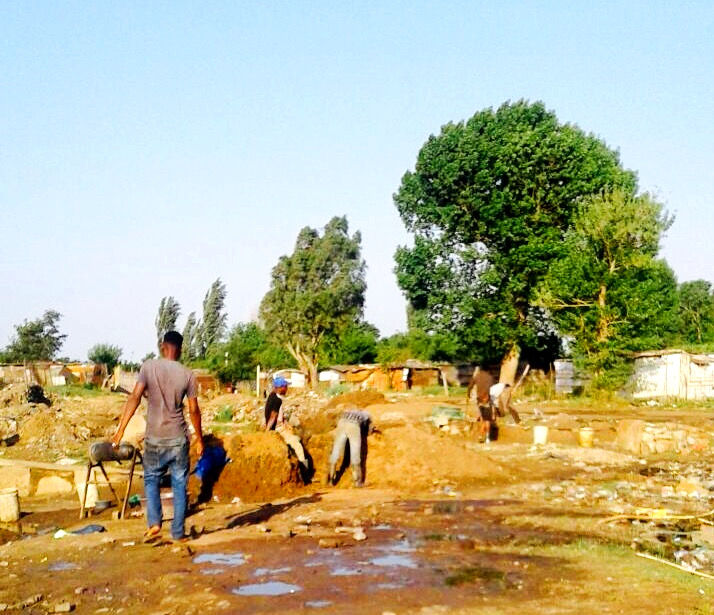School children bunk classes to make gold
Parents complain illegal miners lure their kids with easy money
At 8am, 13-year-old Moses (not his real name) loads soil into a phenduka, a gold refining machine. He mixes the soil with salt, washing powder, vinegar and water. He throws heavy metal balls, the size of tennis balls, into the rusty, cylindrical metal machine, and closes it with a tight rubber lid.
He begins to spin a handle vigorously with his right hand for a while to get the perfect output from his phenduka. The work continues for ten minutes, before he switches hands. The process takes about 40 minutes.
Moses abandoned primary school to begin his shift on the phenduka machine on the illegal mining fields of Van Ryn in Benoni. Next to him are other young boys who appear to be about his age, equally muscular from days of spinning the amaphenduka. Phenduka in Zulu means “changing”, suggesting how the soil particles are transformed into gold and the youngsters hope for a “quick buck”.
Police carry out raids to confiscate the phendukas and arrest illegal gold miners. Parents want their children back in school, rather than working as gold miners.
The runaway youngsters retire here after a day’s work for food and rest. Fires are lit at night where tales are told of daily activities. Older men offload the unprocessed soil at the site during the day.
“They [the men the boys work for] always pay us after our gold has been burnt [smelted] and weighed. With Christmas around the corner I know I’m all set. Where else can a 13-year-old boy like myself get such easy money?” asks Moses.
“School will have to wait. Even my mother complains. But I’m not bothering her for money these days; neither am I stealing from anyone,” he says.
The parents
At a meeting of parents, concern was voiced about the ‘gwejas’, who were said to lure their under aged children to work on phendukas. Some called for them to be arrested. Some even threatened to burn the culprits if they did not stop using school children. Incidents of vigilante burnings have been reported in the area. Parents at the meeting complained that children get money to buy nyaope (a drug).
“All we want is for our children to come home and go back to school,” said one parent.
But a miner in Everest says the young boys came to them begging for work. “They claim that they need the job in order to help their parents at home because there is no food. We do not force them to work,” he said.
According to the law, children aged 15 to 18 may not be employed to do work inappropriate for their age or do work that places them at risk. The National Child Labour Programme of Action formulated in 2003 forbids any form of child labour and child trafficking in South Africa.

Support independent journalism
Donate using Payfast

Next: Women who fought apartheid commend achievements of Fees Must Fall
Previous: Academics and the Fallist movement
Letters
Dear Editor
The hypocrisy of a concept such as "illegal mining" continually perpetuates the legacy of apartheid of skewing the mining sector to continually favour established companies of Guptas and friends, and almost completely neglects black-operated small-scale mining activities and prospective black mining entrepreneurs. When did entrepreneurship become illegal?
Instead of criminalising the activities of these gold miners, you can come up with a support programme that can be incorporated into the schooling curriculum to spark and create interest in mining for the children or maybe even regular visits to these sites for practical skills training for older kids eligible to work. Not some theoretical workshop delivered in a language that will take them almost 12 years to understand in a schooling system that will not guarantee them access to higher education for a degree in mining engineering.
There must something fundamentally flawed in that community that creates situations where children see it fit to go and work instead of attending classes. Poverty is driver for these so called illegal mining operations. Don't get me wrong fellow South Africans, I am not saying children neglect school and be hard labourers at such a young age. However, this could be brilliant opportunity to make the best of out a situation that perceived to be a criminal activity.
The abolition of apartheid was supposed open up a number of opportunities for fellow black natives, but many obstacles to equity still remain - in their structural forms. Comrades, the mining sector has been the cornerstone of the South African economy for years, and yet it has been used by the white minority to perpetuate inherent obstacles by precluding previously disadvantaged people from participating meaningfully in the exploration of the mineral resources of their country. Instead, we continually create spaces where Guptas can come and capture our country through the same mining sector that continues to undermine the ingenuity of our black people.
If a 13-year-old Luyolo Somane can load soil into a phenduka and then
© 2016 GroundUp. 
This article is licensed under a Creative Commons Attribution-NoDerivatives 4.0 International License.
You may republish this article, so long as you credit the authors and GroundUp, and do not change the text. Please include a link back to the original article.

